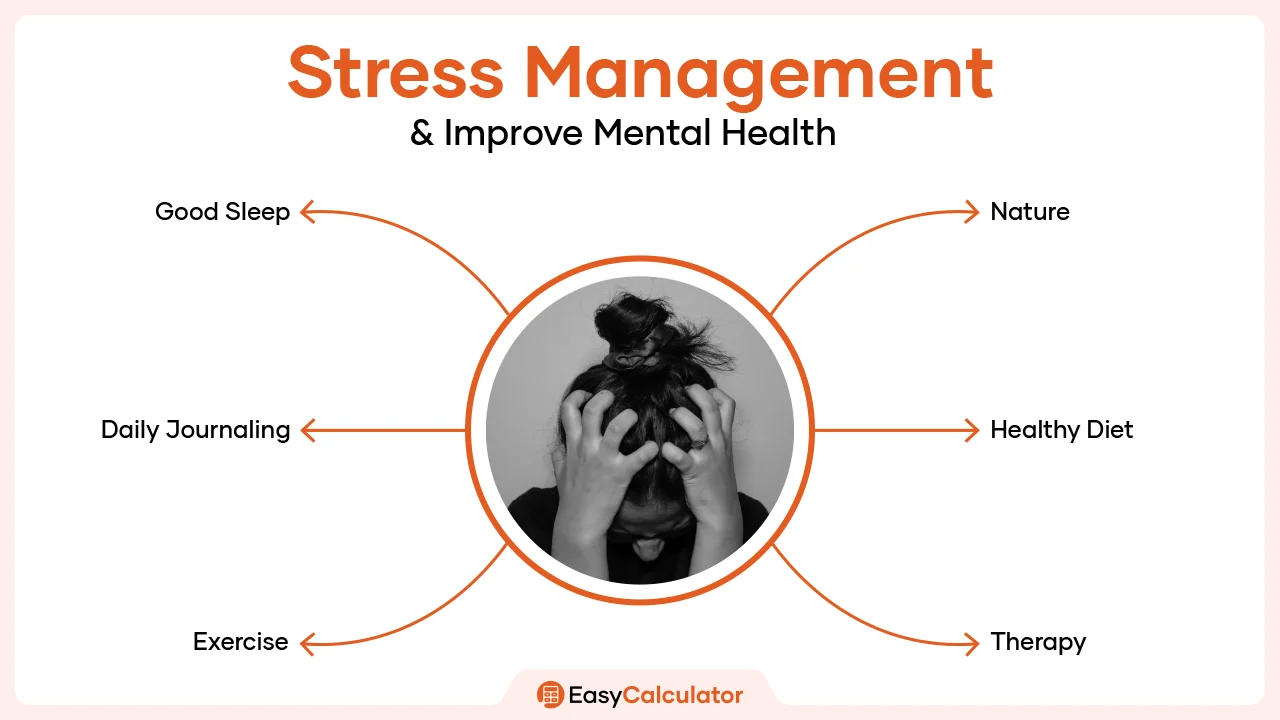How to Manage Stress and Improve Mental Health in 2025
In a fast-paced and constantly evolving world, managing stress and maintaining good mental health are more important than ever. As we look towards 2025, stress management and mental health will become increasingly important. Proactive and sustainable practices now can lay the groundwork for a healthier, more balanced future.
However, every individual is somehow facing stress and mental burden. In this blog, we discuss effective strategies to cope with stress and improve mental well-being.

What is stress management?
Stress is a normal reaction to difficulties in life. Everyone is facing this. Management of stress is possible when you have strong mental health or adopt ways to care for yourself, but when we leave it unchecked, it can lead to anxiety, depression, cardiovascular problems, and various other physical ailments. The Geriatric Depression Scale helps to check your depression score.
However, when you learn the value of self-care techniques in mental health, you can respond better to stressful situations. As well as avoid or lessen the pain and other symptoms that stress can cause.
How Does Stress Affect Our Health?
Environmental pressure exerts mental health strain, which leads to increased cortisol levels and a weakened immune system. Chronic stress can manifest in many different ways, including the following:
- Anxiety and depression
- Physical symptoms like chest pain and fatigue
- Insomnia and headaches
- High blood pressure and digestive issues
- Cognitive impairments
However, when improper mental wellness prevails with unhealthy coping mechanisms, such as substance abuse and eating disorders, hence, high stress levels can also contribute to the development of chronic conditions such as heart disease, diabetes, and obesity.
Blood Pressure Calculator, BMI and BSA Calculator, Heart Rate Calculator, and ASCVD Risk Calculator help you to monitor and track your health indicators. Consequently, you are able to take preventative measures in order to manage stress and avoid potential health complications.
Who faces stress?
Stress can affect anyone, regardless of age, gender, or occupation. A homemaker, a student, a teacher, a mother, a father, a doctor, or a CEO can all face stress at some point in their lives. As a consequence of chronic stress, one may experience a decline in overall well-being, as well as problems with their mental and physical health, as well as disruptions in their sleep.
Here we also address self care for mental health professionals, who are particularly vulnerable to burnout and compassion fatigue due to the nature of their work. However, self care is essential for mental health providers to help others.
What are methods of self care in mental health?
Self-care techniques for mental health include relaxation strategies, physical methods, and cognitive solutions. Practicing mindfulness, engaging in regular exercise, maintaining a healthy diet, seeking therapy or counseling, and setting mutual limits with other people are all examples of self-care techniques that can be utilized to improve mental health.
Relaxation Strategies
This is a relaxing technique that can help reduce stress and promote a sense of calm. Such as deep breathing exercises, meditation, or progressive muscle relaxation.

1. Mindfulness
Mindfulness is a simple concept that requires commitment and practice. To start this therapy, you need to take deep breaths. It also allows you to enjoy a walk and practice mindful eating.
Moreover, notice your breath, surroundings, and thoughts while returning to the present. Listen to your body when hungry and full. In short, just keep an eye on yourself and your surroundings.
2. Meditation
When you isolate yourself in comfortable surroundings and focus on your breath or a mantra, you are practicing meditation. This practice can help reduce anxiety and improve overall well-being. It has the potential to not only improve emotional health but also increase self-awareness.
3. Build Relationships
Isolation is not a good option for everyone; you need connection. Building relationships with others can provide support, companionship, and a sense of belonging.
Making these kinds of connections can do wonders for your emotional and mental well-being. Remember to nurture your relationships and prioritize meaningful connections in your life.
4. Digital Detox
In this digital age, screen time and social media can be overwhelming. You can take a break from technology, or a digital detox. Which can help reduce stress and improve focus. Restrict the amount of time you spend in front of electronic devices. Additionally, make time for relaxing activities.
5. Spiritual connections
Having a faith or seeking a mentor plays a psychological role and provides emotional support. In difficult times, spirituality or mentoring can bring peace and comfort. Your anxiety levels may decrease as you feel more connected to something greater than yourself.
6. Nature Therapy
Spending time outside in natural settings is relaxing therapy for yourself; even when you sit in the garden, doing nothing but appreciating the nature, it helps to calm your nerves. It lowers cortisol and boosts mood. Doing things like gardening, going on hikes, or even just strolling around a park can have powerful effects.
Physical Methods
Physical Techniques involve activities like yoga, tai chi, or regular exercise. These activities can help reduce muscle tension, improve flexibility, and increase overall physical well-being.

1. Laughter therapy
When life is in chaos, this therapy helps in reducing stress levels. A group of people laughing together, happily admiring little things, can be a great way to boost mood and decrease anxiety. Additionally, the act of laughing can release tension in the body and promote relaxation, further reducing stress levels.
2. Regular Exercise
Moving your body and involving yourself in physical activities consider self-healing. However, when you exercise, whether it’s walking, running, or dancing, your body releases endorphins, which are natural feel-good chemicals that can alleviate anxiety and stress.
3. Healthy Diet
What you eat, your body tells about it. When you consume a balanced diet rich in fruits, vegetables, whole grains, and lean proteins. Your body relaxes because all body requirements are fulfilled.
Since it contains essential nutrients that support mental well-being and help reduce stress levels. Limiting sugar, caffeine, and processed foods can also improve energy and mood.
4. Good Night Sleep
Sleep is the natural process of body healing and restoration. A good night’s sleep is essential for overall well-being and mental health. It allows the body to repair and recharge, improving cognitive function and reducing stress levels. Prioritizing quality sleep can lead to increased productivity, better mood, and overall better health.
5. Quit taking drugs
Unnecessary habits of drug taking or engaging in other substances or alcohol can have negative effects on mental health and overall well-being. One way to beat addiction and start living a healthier life is to get help from a healthcare provider or therapist. Seeking help is the first step towards recovery and a happier, healthier future.
Cognitive Strategies
Self-care ideas for mental health include techniques like positive self-talk, challenging negative thoughts, or practicing gratitude to improve mental well-being and resilience. Remember, it’s fine to ask for help when you need it. Abbreviated Mental Test and Geriatric Depression Scale help assess cognitive function and screen for depression in older adults.

1. Daily Journaling
Daily self-reflection habits help you with your positive and negative thoughts, identify patterns in your emotions, and track your progress toward mental wellness. When you write down things you’re thankful for to foster a positive mindset. It serves as a therapeutic outlet that increases self-awareness and improves mental health over time.
2. My Own Time
When you dedicate time each day to activities you enjoy. It brings satisfaction and relaxation, so it improves your mental health. Your favorite activity could be anything you like. It may be your hobby:
listening to or singing music, cooking, or reading a book. You can call a friend or connect with people you love. Over time, self-care may promote mental health and self-awareness.
3. Get Expert Advice
Find healthy ways to deal with stressful situations; you can try therapy or counseling. Remember, seeking professional help is a sign of strength, not weakness. To stay mentally healthy, prioritize self-care and seek help. Additionally, consider your mental health is as vital as your physical health.
4. Share your feelings
Expressing your thoughts is necessary, no matter if you’re happy or sad. Process grief with care and allow yourself to feel all emotions. Remember, it’s okay to not be okay sometimes. Take your time to heal and seek support when needed.
Conclusion: A Journey Towards Wellness
Improving emotional wellness is an ongoing journey. Which can handle with prioritizing self-care, nurturing relationships, and implementing daily stress management techniques. However, you can build resilience and find balance in 2025 and beyond.
Remember, it’s about progress, not perfection. We hope to embrace the journey towards a healthier, happier you!
